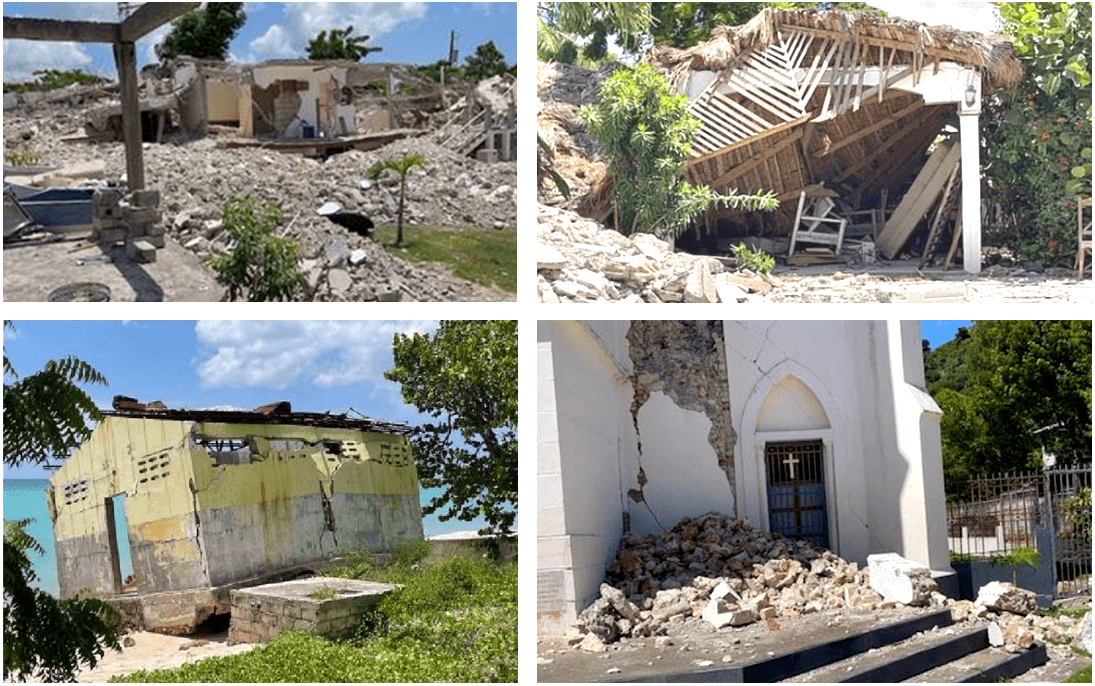
On August 14, a 7.2 magnitude earthquake rocked Haiti’s southern peninsula, releasing almost twice as much energy as the 7.0 magnitude quake in 2010.
The quake struck 78 miles west of Haiti’s capital, Port-au-Prince, and affected two cities, Les Cayes and Jeremie, resulting in major devastation with people caught under rubble and collapsed buildings. Phone lines were down near the epicenter of the quake. It took some time for the news to emerge from those cities. The only road linking Port-au-Prince to the affected area is dangerous and at times impassable due to gang violence, so the transport of relief aid is slow and laborsome.
This same region was battered by Hurricane Matthew in 2016, which killed nearly 900 people and reportedly destroyed 90% of some areas, including the main road connecting the peninsula to the capital. The region was still recovering from that disaster when the quake happened. It also coincided with immense national political turmoil following the July 7 assassination of its leader, President Jovenel Moïse.
Haiti remains one of the poorest in the world, with 60% of the population earning less than $2.00 a day. A power vacuum, severe poverty and rampant gang violence has left the country ill-prepared to handle a disaster of this scale.
UNICEF’s August 29 publication reported the following statistics: As of Saturday, 21 August the country counted 2,207 deaths and 12,268 wounded. Approximately 52,953 houses were completely destroyed and 77,006 severely damaged, while 650,000 people are in need of humanitarian assistance, including 260,000 children. Severe damage to infrastructures such as hospitals, schools, water systems and roads have left basic social services in a dire situation. Tropical storm Grace reached the country on Monday, 16 August, triggering mudslides, hampering relief efforts and weakening the already fragile telecommunication system.
Disaster Relief Provided by BCDC in Partnership with CINHP
by Sharon Cushing
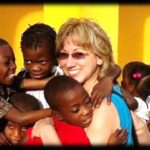
Those who survived the August 14th earthquake and subsequent Tropical Storm are still in grave danger. The earthquake demolished buildings, killing thousands. Landslides buried homes, businesses, farms, gardens, and livestock. Water is in short supply as many cisterns were destroyed by the earthquake and natural water sources have been contaminated. Roads and bridges were damaged or destroyed, making it difficult for aid to reach the affected towns.
Many are homeless or injured and hunger is rampant in the hardest-hit areas. Gangs continue impeding delivery of humanitarian assistance – attacking convoys and stealing food and supplies. In a place where food insecurity was already a problem this has made the predicament increasingly dire.
Homeless women and children are especially vulnerable to hunger, violence, and exploitation. COVID-19-related health risks present additional insecurity. Hospitals are overcrowded and the staff overwhelmed. Some areas are remote and nearly unreachable.
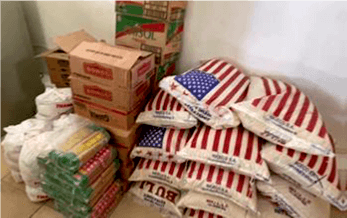 Though our CINHP school is not in the affected area (located in the village of Lesnipasse, 10 km southeast of Port-au-Prince), we received a great outpouring of concern from our donors who wanted to help. To date, $10,000 has been donated through our ministry and sent to our partners at Beraca Community Development Corporation (www.bcdc.org) whose people tirelessly work on the ground in the disaster area. This is a great testament to the goodness of God through his people.
Though our CINHP school is not in the affected area (located in the village of Lesnipasse, 10 km southeast of Port-au-Prince), we received a great outpouring of concern from our donors who wanted to help. To date, $10,000 has been donated through our ministry and sent to our partners at Beraca Community Development Corporation (www.bcdc.org) whose people tirelessly work on the ground in the disaster area. This is a great testament to the goodness of God through his people.
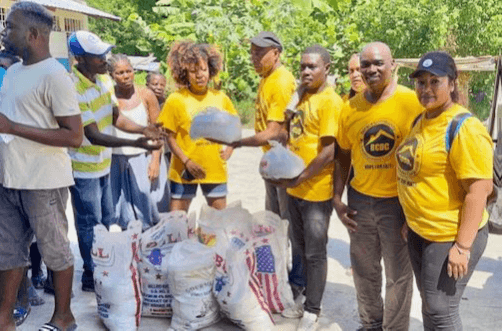 Thankfully, our partners at BCDC have offices near the hardest-hit areas: Port Salut (Les Cayes) and Jeremie. This gives them proximity to those most affected by these twin catastrophes. Beraca’s network of 1700 churches in that region are being used as distribution hubs to expedite assistance to the victims in the ravaged areas and facilitate the ongoing rescue and relief efforts. They administer emergency first aid and supply families with safe drinking water, food, hygiene kits, medicine, tents, blankets, and clothing, which relieves immediate needs. Our donated funds to the Disaster Relief are going to supporting their efforts.
Thankfully, our partners at BCDC have offices near the hardest-hit areas: Port Salut (Les Cayes) and Jeremie. This gives them proximity to those most affected by these twin catastrophes. Beraca’s network of 1700 churches in that region are being used as distribution hubs to expedite assistance to the victims in the ravaged areas and facilitate the ongoing rescue and relief efforts. They administer emergency first aid and supply families with safe drinking water, food, hygiene kits, medicine, tents, blankets, and clothing, which relieves immediate needs. Our donated funds to the Disaster Relief are going to supporting their efforts.
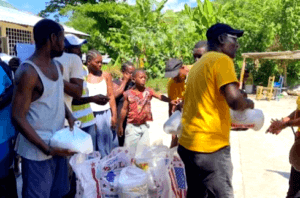 Following Phase 1—Rescue, BCDC will begin Phase 2—Rebuild: helping reconstruct homes, churches, schools, and clinics, restore businesses, replant gardens, and meet other needs. We will work with them as we can.
Following Phase 1—Rescue, BCDC will begin Phase 2—Rebuild: helping reconstruct homes, churches, schools, and clinics, restore businesses, replant gardens, and meet other needs. We will work with them as we can.
Teams have been on the ground helping to console those affected and to reassure them that hope is not lost and that they are not alone. They know that God and people like you feel their pain and care. 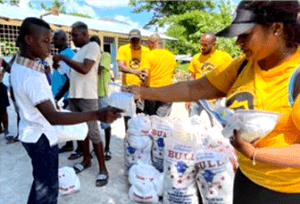 Perhaps this comfort is even more important than the material aid. Please pray for those who do not yet know Jesus – that they’ll be encouraged to seek and follow Him AND that God continues to lead and provide for these vulnerable families.
Perhaps this comfort is even more important than the material aid. Please pray for those who do not yet know Jesus – that they’ll be encouraged to seek and follow Him AND that God continues to lead and provide for these vulnerable families.
Please pray for the safety and efficacy of the teams on the ground and that the recipients of their service will know they are loved and cared for. Continue to pray and spread the word to others who might be interested in helping.
HISTORIC BACKGROUND ON THE SERVICES BERACA COMMUNITY DEVELOPMENT CORPORATON HAS RENDERED TO THE PEOPLE IN HAITI
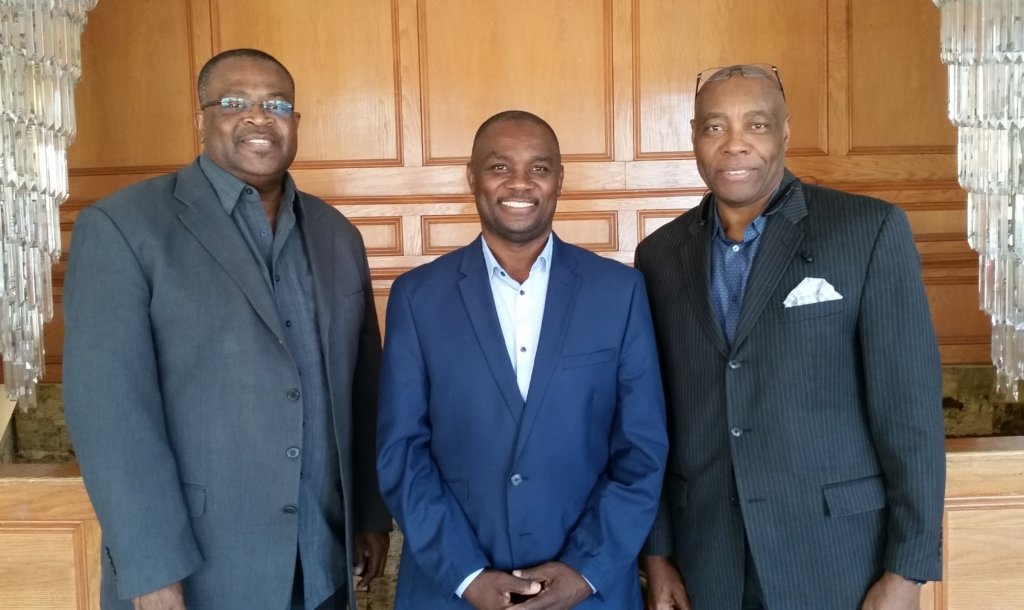
I (R.K.) met Pastor Jean-Pierre Mullery (Center) and two of his Co-Pastors during my visit to their church four years ago.
After the January 12, 2010 7.0 magnitude earthquake in Haiti, Pastor Mullery and his team extended BCDC from NY to Haiti, where they currently serve the cities of Leogane, Cabaret, Jeremie and Cape Haitian with a number of community programs and mercy ministries in addition to planting churches and rebuilding schools and businesses. This has caused scored of impoverished and destitute people in the region to be lifted out of poverty and become productive and fulfilled, as they learn to bloom where they are planted. Following are some of the programs:
- Training and mentoring Pastors and leaders. They are currently training 1700 leaders.
- Creating and sustaining approximately 400 jobs through their motorcycle taxis, micro-lending and mini bus services.
- Conducting mobile medical clinics, bringing healthcare to thousands of underserved Haitians through the local churches in their communities.
- Training and equipping teachers and principals, providing a good education to their students by the use of certified U.S. Haitian-American teachers.
- Planting churches that are the hubs for spiritual and socio-economic health and development in the Haitian communities.
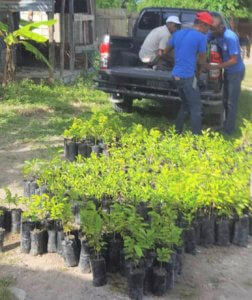
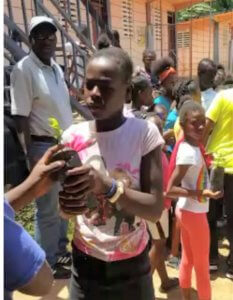 The event of Hurricane Matthew not only devastated the region, but also caused food shortages throughout the nation. BCDC began networking with some of the local churches to re-plant what the hurricane destroyed, which now includes hundreds of churches.
The event of Hurricane Matthew not only devastated the region, but also caused food shortages throughout the nation. BCDC began networking with some of the local churches to re-plant what the hurricane destroyed, which now includes hundreds of churches.
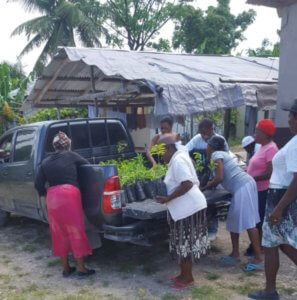 The Reforestation Project focuses on replanting trees in the denuded countryside to help avoid the continued massive erosion of cultivated land in the region. It is known as the breadbasket of the country, as a good portion of the crops that feed Haiti are grown there. For every tree gone, they plant three new seedlings. Teams from Beraca keep traveling to Haiti with needy material, tools, and supplies, and work in partnership with Haitian believers in rebuilding church buildings, community centers, and homes that have been destroyed by the hurricane.
The Reforestation Project focuses on replanting trees in the denuded countryside to help avoid the continued massive erosion of cultivated land in the region. It is known as the breadbasket of the country, as a good portion of the crops that feed Haiti are grown there. For every tree gone, they plant three new seedlings. Teams from Beraca keep traveling to Haiti with needy material, tools, and supplies, and work in partnership with Haitian believers in rebuilding church buildings, community centers, and homes that have been destroyed by the hurricane.
FROM R.K.’S CORNER
 The Bridge partners with two excellent Christian organizations who have been on the ground in Haiti for years, doing outstanding work in serving the local population by helping them improve their and their family’s lives, both spiritually and physically. Children in Need Haitian Project (CINHP) established in NYC in 2005, has been doing an outstanding job in helping educate the children in the town of Lesnipasse, 10 km southeast of Port-au-Prince. Four years ago, Sharon Cushing, CINHP’s Administrator, introduced me to Mullery Jean-Pierre, Senior Pastor of Beraca Baptist Church in Brooklyn, NY, who with his dedicated team has served his Haitian people since 2010 in the region of the recent earthquake. I strongly encourage you to take time to read prior updates on the effective service these two groups of Americans are doing in helping the Haitian people help themselves and bloom where they are planted. You will find those stories on our website, just click on:
The Bridge partners with two excellent Christian organizations who have been on the ground in Haiti for years, doing outstanding work in serving the local population by helping them improve their and their family’s lives, both spiritually and physically. Children in Need Haitian Project (CINHP) established in NYC in 2005, has been doing an outstanding job in helping educate the children in the town of Lesnipasse, 10 km southeast of Port-au-Prince. Four years ago, Sharon Cushing, CINHP’s Administrator, introduced me to Mullery Jean-Pierre, Senior Pastor of Beraca Baptist Church in Brooklyn, NY, who with his dedicated team has served his Haitian people since 2010 in the region of the recent earthquake. I strongly encourage you to take time to read prior updates on the effective service these two groups of Americans are doing in helping the Haitian people help themselves and bloom where they are planted. You will find those stories on our website, just click on:
https://www.bridgeinternational.org/category/haiti/
If you want to give toward specific emergency items for the hardest hit victims, Sharon has complied a suggested list below
EMERGENCY RESPONSE NEEDS WITH APPX. COSTS:
Personal Needs:
- Meals for a family for a week – $10
- Hygiene kits – $25
- Family emergency shelters – $40
- Water filtration kits – $50
- Solar panel lights with USB charger – $70
Medical Needs:
- Cots for patients at hospitals – $60
- Generators for hospitals – $2,500
- Large canopy tent shelter for hospitals – $15,000
